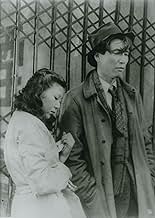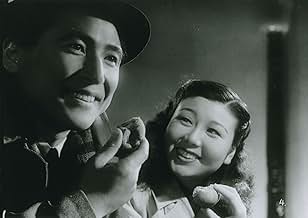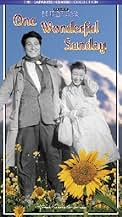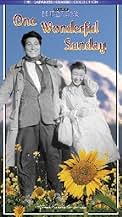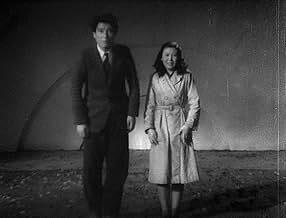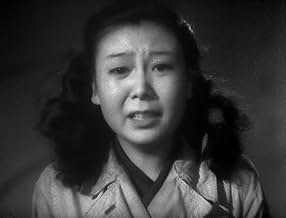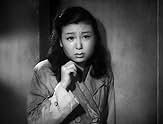NOTE IMDb
7,2/10
4 k
MA NOTE
Lors d'une sortie du dimanche dans Tokyo ravagé par la guerre, Yuzo qui a perdu tout espoir et Masoko encore optimiste cherchent du travail et un logement, ainsi que des divertissements abor... Tout lireLors d'une sortie du dimanche dans Tokyo ravagé par la guerre, Yuzo qui a perdu tout espoir et Masoko encore optimiste cherchent du travail et un logement, ainsi que des divertissements abordables pour passer le temps.Lors d'une sortie du dimanche dans Tokyo ravagé par la guerre, Yuzo qui a perdu tout espoir et Masoko encore optimiste cherchent du travail et un logement, ainsi que des divertissements abordables pour passer le temps.
- Réalisation
- Scénario
- Casting principal
- Récompenses
- 2 victoires au total
Sachio Sakai
- Shady Ticket Man
- (non crédité)
Avis à la une
Far from being one of Kurosawa's best films, it is still a powerful and thoughtful one. He had already developed his filmmaking mastery at this point of time, and it can surely be seen by the way some of the scenes are made.
The film concerns a story of love surrounded by poverty and despair; the main characters of the film have the whole Sunday to go out and be together, the only problem being their shortness of money, as they only had 35 yens to go through the day. Being short of money as they were, there were not many things they could do, so they had to spend them wisely. This mainly leads to frustration from both sides, and so the film becomes depressing most of the time, even though they are really in love with each other and are happy to have a day available for them. Throughout the film they will encounter many obstacles and disheartening experiences, which will push them towards feeling impotent, but they always manage to bring happiness out of all that awful moments, and there is where the magic of this film resides.
It might seem like a simple, clichéd love story we have always been familiar with, and it actually could have just been that, if it was not for the Excellency of Kurosawa's filmmaking skills. He brings magic to many of the main scenes of the film, which definitely increases the experience by showcasing everything in detail. The last scene is really outstanding because of the way it is portrayed; you can actually feel both the pain and happiness they are feeling.
In conclusion, this film is definitely overshadowed by other masterpieces from Kurosawa's filmography, and is definitely not the best from him, but this little film is not to be skipped if you really like the director.
My score: 7.7/10
The film concerns a story of love surrounded by poverty and despair; the main characters of the film have the whole Sunday to go out and be together, the only problem being their shortness of money, as they only had 35 yens to go through the day. Being short of money as they were, there were not many things they could do, so they had to spend them wisely. This mainly leads to frustration from both sides, and so the film becomes depressing most of the time, even though they are really in love with each other and are happy to have a day available for them. Throughout the film they will encounter many obstacles and disheartening experiences, which will push them towards feeling impotent, but they always manage to bring happiness out of all that awful moments, and there is where the magic of this film resides.
It might seem like a simple, clichéd love story we have always been familiar with, and it actually could have just been that, if it was not for the Excellency of Kurosawa's filmmaking skills. He brings magic to many of the main scenes of the film, which definitely increases the experience by showcasing everything in detail. The last scene is really outstanding because of the way it is portrayed; you can actually feel both the pain and happiness they are feeling.
In conclusion, this film is definitely overshadowed by other masterpieces from Kurosawa's filmography, and is definitely not the best from him, but this little film is not to be skipped if you really like the director.
My score: 7.7/10
With this warm and uplifting film, the effect Kurosawa achieves is in the simplicity. The story is threadbare. Two lovebirds try to spend a Sunday together in post-war Tokyo and enjoy themselves with only 35 yen in their pockets. Kurosawa never ceases to amaze me because of his incredibly acute comprehension of the visual effects of a story. The simpler the story is, the more it becomes simply a day in their lives. The more it becomes a day in the life, the more upsetting we find the challenges facing them because of the Occupation and the crumbling economy at the time.
It's almost like a lightweight version of The Lost Weekend. There are no debilitating problems like alcoholism or writer's block. There are just obstructions and inconveniences with which the characters can either roll or stew around.
One Wonderful Sunday is a beautiful slice of life from a time that could be many different times in many different places. It's a peaceful movie about the peace that is always there for a given person, their journey being to find it. I have rarely seen a sequence so beautifully crafted on film as the two lovers in the empty, decaying concrete exterior auditorium, where one resolves to create the music they have been struggling to hear. There is hardly a handful of filmmakers living today that would think of such a thing. Kurosawa may have had the clearest, purest understanding of cinema out of any filmmaker.
It's almost like a lightweight version of The Lost Weekend. There are no debilitating problems like alcoholism or writer's block. There are just obstructions and inconveniences with which the characters can either roll or stew around.
One Wonderful Sunday is a beautiful slice of life from a time that could be many different times in many different places. It's a peaceful movie about the peace that is always there for a given person, their journey being to find it. I have rarely seen a sequence so beautifully crafted on film as the two lovers in the empty, decaying concrete exterior auditorium, where one resolves to create the music they have been struggling to hear. There is hardly a handful of filmmakers living today that would think of such a thing. Kurosawa may have had the clearest, purest understanding of cinema out of any filmmaker.
ONE WONDERFUL SUNDAY (1947) has a simple little plot. A young Tokyo couple have almost no money to spend on their only day available for a date. It isn't long until the money is gone, as well as the young man's spirit. The ending is uncomfortably corny, you will squirm in your seat. There is signs of Akira Kurosawa becoming a great director. He makes us pay attention to the decreasing amount of money (much like he made us pay attention to the number of slain bandits in SEVEN SAMURAI, and his stab at Frank Capra style humor is pretty good. A must see for the student of this great director.
Akira Kurosawa's movies have a whole range of themes, be they set in contemporary or in historical eras. To name a few: the chasm between the rich and the poor, between the strong and the weak, between the courageous and the cowards, between the powerful and their foot folk, between the honest and the deceitful, between the clever and the idiots, between the sincere and the dishonest, and also, importantly, between war (destruction and loss) and peace (happiness).
In this movie, made just after WW II, he depicts the struggle for life of 'poor lovers', whose dreams were shattered by the war. Japan is in dire straits: no jobs, and, if you have a job, bad salaries; high rents for decent shelters and huge inflation. 'Free markets' are controlled by 'black' merchants and their thugs. There is still an upper class, which looks with contempt on those without money, their former foot folk. The girl remains optimistic, but her lover is deeply depressed.
Akira Kurosawa made some very risky shots on the music of F. Schubert's unfinished symphony. But, he had the mastery to create the perfect mood. Not to be missed and certainly not by A. Kurosawa fans.
In this movie, made just after WW II, he depicts the struggle for life of 'poor lovers', whose dreams were shattered by the war. Japan is in dire straits: no jobs, and, if you have a job, bad salaries; high rents for decent shelters and huge inflation. 'Free markets' are controlled by 'black' merchants and their thugs. There is still an upper class, which looks with contempt on those without money, their former foot folk. The girl remains optimistic, but her lover is deeply depressed.
Akira Kurosawa made some very risky shots on the music of F. Schubert's unfinished symphony. But, he had the mastery to create the perfect mood. Not to be missed and certainly not by A. Kurosawa fans.
I loved this film for all the reasons already advanced on this board. A story about two lovers who have only each other in a devastated, corrupted, and occupied society is universal in every sense.
I think Kurosawa's postwar films are especially interesting from a political point of view. All of his films had to pass U.S. censors, and so his political comments are shrouded in symbolism and cinematic sleight of hand. American occupation authorities doubtlessly viewed this film as a simple tale of struggling lovers. But a closer look reveals much more.
"Yuzo" is a war veteran down on his luck. Millions of Japanese war veterans returned home to a society ashamed of their service and anxious to forget their failure. "Masako" is his lover but their future together is rendered difficult by their mutual poverty.
Kurosawa gives us glimpses of pathetic war orphans, destitute women forced into prostitution, and a new economic oligarchy made wealthy by black markets. The ruins of Tokyo are presented only on distant horizons or as incidental background, but the damage inflicted by the 20th U.S. Air Force is clearly implied. None of these elements would ever pass U.S. censorship had they been essential to the story.
Postwar Japanese audiences. however, doubtlessly recognized these subtle references to their occupied and devastated country. That Kurosawa could express these matters without provoking American censorship is itself a testament to his artistic skills.
I think Kurosawa's postwar films are especially interesting from a political point of view. All of his films had to pass U.S. censors, and so his political comments are shrouded in symbolism and cinematic sleight of hand. American occupation authorities doubtlessly viewed this film as a simple tale of struggling lovers. But a closer look reveals much more.
"Yuzo" is a war veteran down on his luck. Millions of Japanese war veterans returned home to a society ashamed of their service and anxious to forget their failure. "Masako" is his lover but their future together is rendered difficult by their mutual poverty.
Kurosawa gives us glimpses of pathetic war orphans, destitute women forced into prostitution, and a new economic oligarchy made wealthy by black markets. The ruins of Tokyo are presented only on distant horizons or as incidental background, but the damage inflicted by the 20th U.S. Air Force is clearly implied. None of these elements would ever pass U.S. censorship had they been essential to the story.
Postwar Japanese audiences. however, doubtlessly recognized these subtle references to their occupied and devastated country. That Kurosawa could express these matters without provoking American censorship is itself a testament to his artistic skills.
Le saviez-vous
- AnecdotesThe film's climax was considered a failure in both Japan and the U.S. as audiences refused to clap for the lead characters, though supposedly it went over very well in France, gaining much audience participation.
- GaffesA clock is seen above a shop in the baseball scene. The time showing is 5:05, but it is still only morning.
- Bandes originalesLa Cumparsita
Composed by Gerardo Matos Rodríguez
Meilleurs choix
Connectez-vous pour évaluer et suivre la liste de favoris afin de recevoir des recommandations personnalisées
- How long is One Wonderful Sunday?Alimenté par Alexa
Détails
- Date de sortie
- Pays d’origine
- Langue
- Aussi connu sous le nom de
- One Wonderful Sunday
- Lieux de tournage
- Toho Studios, Tokyo, Japon(Studio)
- Société de production
- Voir plus de crédits d'entreprise sur IMDbPro
- Durée
- 1h 48min(108 min)
- Couleur
- Mixage
- Rapport de forme
- 1.37 : 1
Contribuer à cette page
Suggérer une modification ou ajouter du contenu manquant

